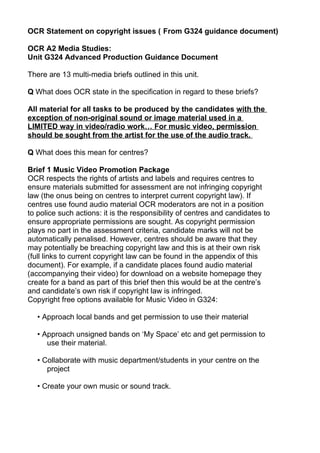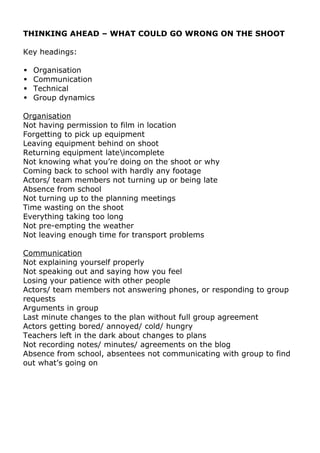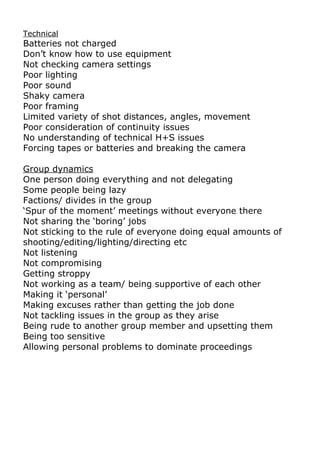Process
- 1. TRACK SELECTION Your potential track must conform to the following criteria: 1. it must provide opportunities for original and creative work 2. it must not have been promoted successfully in the last 10 years by a professional music video 3. it must have a clearly definable target audience 4. it must be generically identifiable ie as clearly belonging to a particular genre/sub genre 5. it must be of digital quality and in an appropriate format for capturing to Adobe Premiere 6. the track must have been mixed and recorded to a high standard, including if using an independent artist (eg local band) 7. You need to be able to prove that you have checked ownership and have sought permission to use the track Your choices will need to: 1. be discussed by the group/ class ŌĆō pros and cons identified 2. be filtered out by teachers if unsuitable (please anticipate the likely ŌĆśsecondaryŌĆÖaudience at Latymer (parents, younger children, Headteacher etc) 3. be accessible to all members of your team 4. be chosen by a unanimous group decision (you must all agree) 5. inspire the group to make a creative, original music video that uses and/ or challenges convention 6. be suitable for public broadcast on mainstream music television so >no swearing >no sexually aggressive language/ imagery >avoid drug related lyrics/ imagery You will need to present your track to the teachers for approval before you move forward with planning your pitch. We are happy to help if you have narrowed your selection down to the final 2 or 3 tracks you are keen to work with.
- 2. OCR Statement on copyright issues ( From G324 guidance document) OCR A2 Media Studies: Unit G324 Advanced Production Guidance Document There are 13 multi-media briefs outlined in this unit. Q What does OCR state in the specification in regard to these briefs? All material for all tasks to be produced by the candidates with the exception of non-original sound or image material used in a LIMITED way in video/radio workŌĆ” For music video, permission should be sought from the artist for the use of the audio track. Q What does this mean for centres? Brief 1 Music Video Promotion Package OCR respects the rights of artists and labels and requires centres to ensure materials submitted for assessment are not infringing copyright law (the onus being on centres to interpret current copyright law). If centres use found audio material OCR moderators are not in a position to police such actions: it is the responsibility of centres and candidates to ensure appropriate permissions are sought. As copyright permission plays no part in the assessment criteria, candidate marks will not be automatically penalised. However, centres should be aware that they may potentially be breaching copyright law and this is at their own risk (full links to current copyright law can be found in the appendix of this document). For example, if a candidate places found audio material (accompanying their video) for download on a website homepage they create for a band as part of this brief then this would be at the centreŌĆÖs and candidateŌĆÖs own risk if copyright law is infringed. Copyright free options available for Music Video in G324: ŌĆó Approach local bands and get permission to use their material ŌĆó Approach unsigned bands on ŌĆśMy SpaceŌĆÖ etc and get permission to use their material. ŌĆó Collaborate with music department/students in your centre on the project ŌĆó Create your own music or sound track.
- 3. THINKING AHEAD ŌĆō WHAT COULD GO WRONG ON THE SHOOT Key headings: ’é¦ Organisation ’é¦ Communication ’é¦ Technical ’é¦ Group dynamics Organisation Not having permission to film in location Forgetting to pick up equipment Leaving equipment behind on shoot Returning equipment lateincomplete Not knowing what youŌĆÖre doing on the shoot or why Coming back to school with hardly any footage Actors/ team members not turning up or being late Absence from school Not turning up to the planning meetings Time wasting on the shoot Everything taking too long Not pre-empting the weather Not leaving enough time for transport problems Communication Not explaining yourself properly Not speaking out and saying how you feel Losing your patience with other people Actors/ team members not answering phones, or responding to group requests Arguments in group Last minute changes to the plan without full group agreement Actors getting bored/ annoyed/ cold/ hungry Teachers left in the dark about changes to plans Not recording notes/ minutes/ agreements on the blog Absence from school, absentees not communicating with group to find out whatŌĆÖs going on
- 4. Technical Batteries not charged DonŌĆÖt know how to use equipment Not checking camera settings Poor lighting Poor sound Shaky camera Poor framing Limited variety of shot distances, angles, movement Poor consideration of continuity issues No understanding of technical H+S issues Forcing tapes or batteries and breaking the camera Group dynamics One person doing everything and not delegating Some people being lazy Factions/ divides in the group ŌĆśSpur of the momentŌĆÖ meetings without everyone there Not sharing the ŌĆśboringŌĆÖ jobs Not sticking to the rule of everyone doing equal amounts of shooting/editing/lighting/directing etc Not listening Not compromising Getting stroppy Not working as a team/ being supportive of each other Making it ŌĆśpersonalŌĆÖ Making excuses rather than getting the job done Not tackling issues in the group as they arise Being rude to another group member and upsetting them Being too sensitive Allowing personal problems to dominate proceedings



